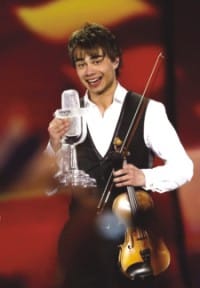Norwegian wins Eurovision Song Contest

Norway’s Alexander Rybak holds the trophy after winning the Eurovision Song Contest in Moscow on May 16.
A boyish, fiddle-wielding Norwegian singer won the Eurovision Song Contest in Moscow on Saturday night, his bouncy ditty was the highlight of the musical bonanza, studded with pyrotechnic artistry and stunning electronic visuals on an epic scale.Twenty-five performers from across Europe competed in Moscow in a musical talent hunt that is one of the most watched annual television events in the world, despite being written off by some as European kitsch.
"Fairytale," penned and performed by 23-year-old fiddler Alexander Rybak, blew away competition from Iceland's Yohanna, who finished second, and Azerbaijan's AySel & Arash, who were third, with a folksy melody to the accompaniment of an acrobatic dance routine and two blonde female support singers.
The elfin-faced Rybak, the winning graduate of a Norwegian television talent show in 2006, accrued the most points in Eurovision's 53-year history, outstripping Finland's Lordi in 2006.
"Thank you so much, Russia. You are just great, thank you," an emotional Rybak, said, speaking in Russian from the stage after the result was announced. "You are the greatest public in the world," he proclaimed, before launching into a repeat performance of the winning entry.
Russia was trying to capitalise on the prestigious event to showcase the nation's hospitality and growing role in modern society, but those efforts were undermined several hours earlier when riot police attacked gay pride rallies in the capital.
Rybak criticised the protesters for choosing the same day as the contest to vent their frustrations.
Minsk-born Rybak, who left Belarus when he was four years old with his musician parents, earned the maximum number of points from several of the participating former Soviet satellite countries.
His performance was greeted by rapturous applause from the spectators thronging the Olimpiisky Sports Complex in central Moscow. The crowd heard a wide array of songs, ranging from traditional cheesy pop to tear-jerking ballads and ear-piercing operatic melodies.
Norway last won the competition in 1995 and as winner will host the show next year.
Russia was pinning its hopes on "Mamo," an overwrought ballad composed by a Georgian songwriter and partially performed in Ukrainian by a Ukrainian-born artiste Anastasia Prikhodko, but she could only muster 11th place.
U.S. burlesque artiste Dita Von Teese, ex-wife of rocker Marilyn Manson, spiced up Germany's act by straddling a shiny lip-shaped black plastic sofa.
The winner of the competition was picked by a combination of telephone voting and official juries from national broadcasters in the 42 nations that originally took part.
Britain had been billed as a favourite for the contest, but its entry, singer Jade, could only manage fifth place, despite composer Andrew Lloyd Webber writing her song.
Bookmakers had also favoured Greece, which was pinning its hopes on an elaborately choreographed stage performance involving a giant flashing treadmill.
Israel made an appeal for peace and harmony with "There Must Be Another Way," sung in Arabic, Hebrew and English by Arab-Jewish duo Noa and Mira.
In a Eurovision first, crew members of the International Space Station gave the command to start telephone voting in a video message from the orbiting science laboratory.
Moscow authorities splashed out 24 million euros ($32.5 million) on the show and a weeklong series of decadent parties.

 For all latest news, follow The Daily Star's Google News channel.
For all latest news, follow The Daily Star's Google News channel. 


Comments